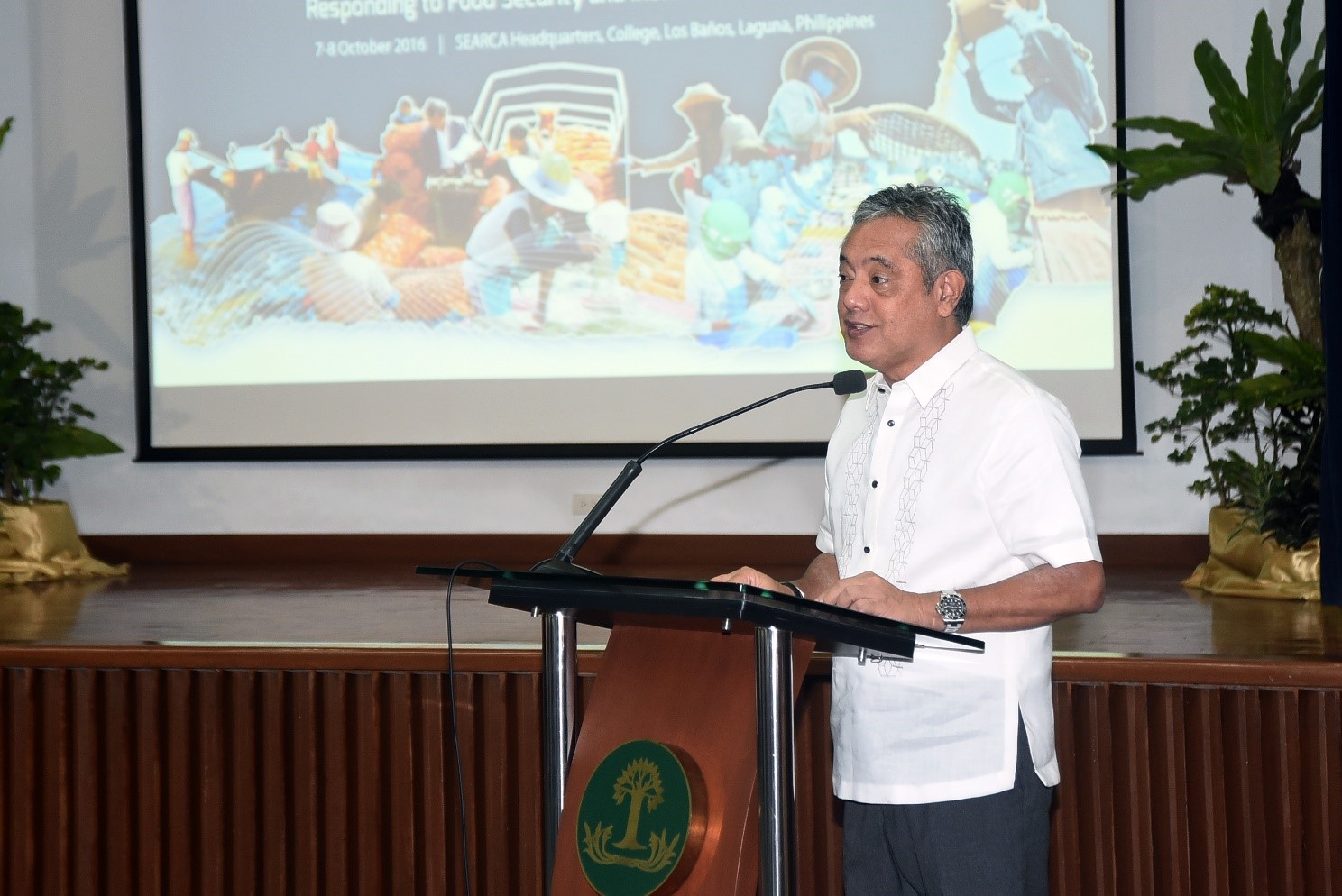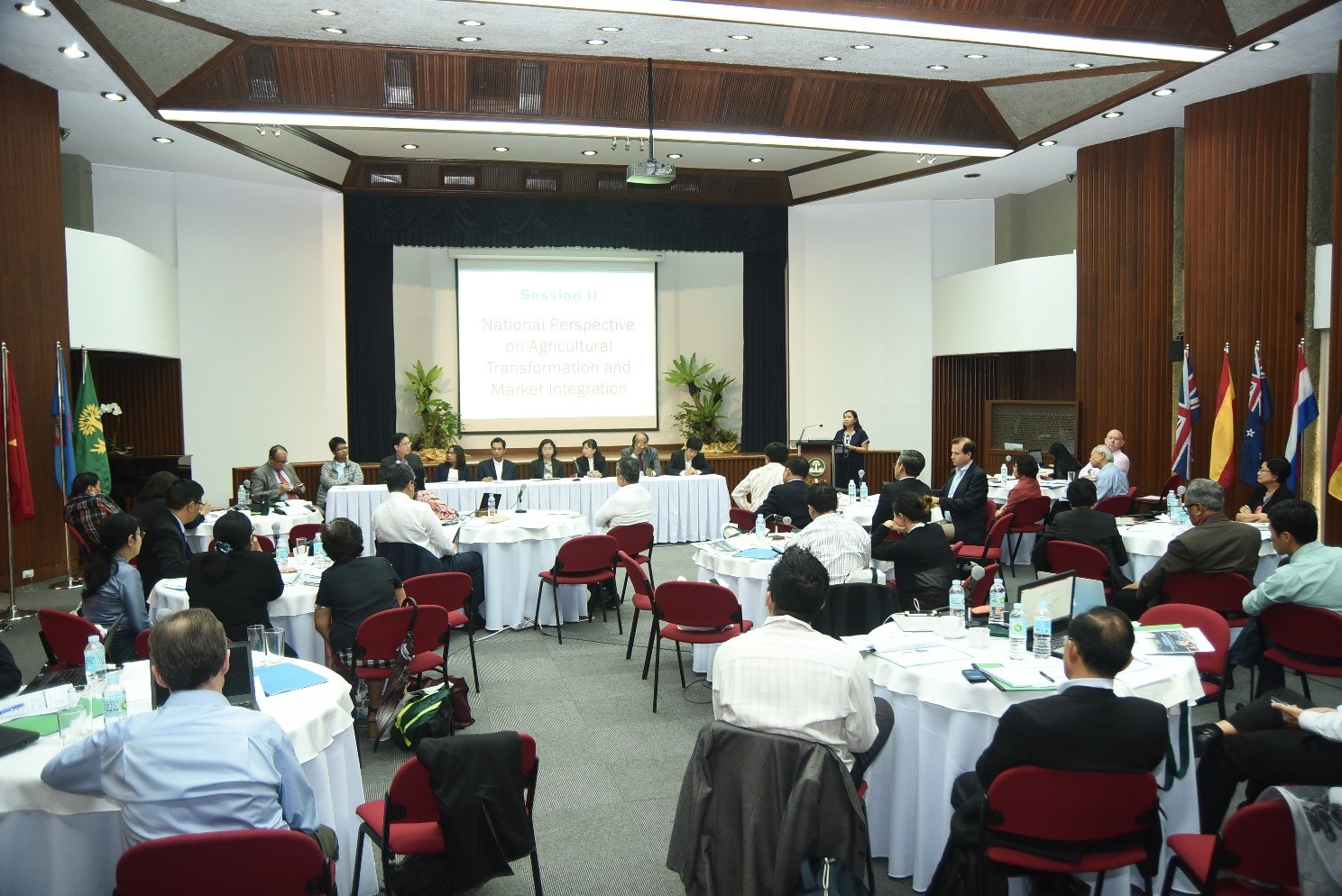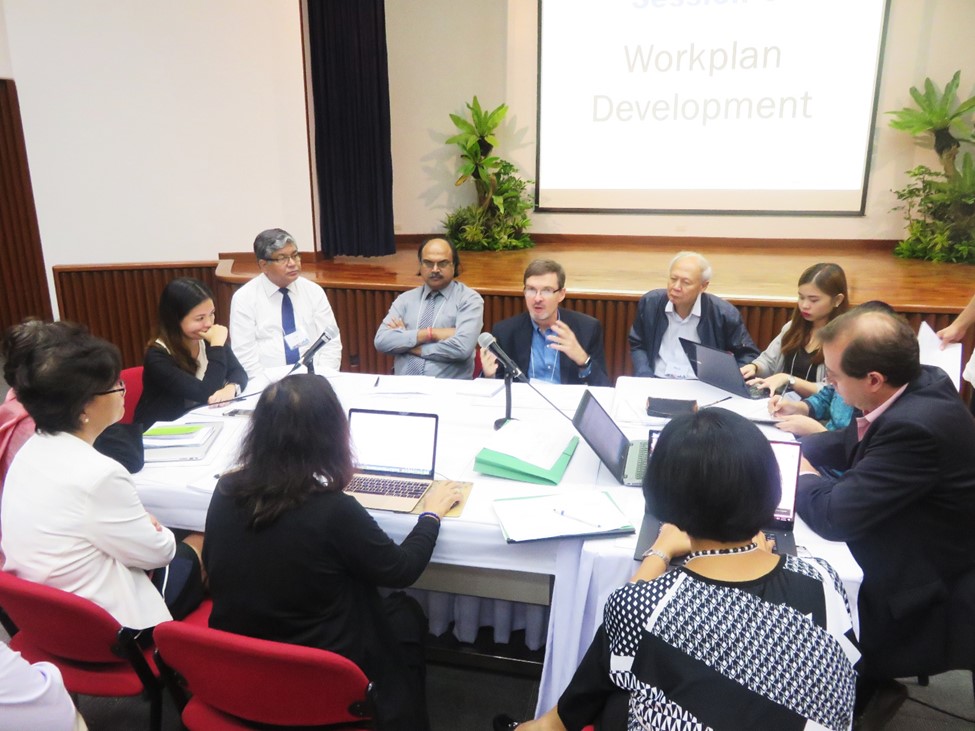The launch workshop comprised three objectives: (1) to gain a good understanding of structural transformation and market integration at the global, regional, and national levels relating to agricultural growth and food security in ASEAN region, and of the various initiatives in the region and in target ASEAN Member States (AMS) that address food security and inclusiveness concerns; (2) to level-off on what the project hopes to achieve and on the roles of various stakeholders; and (3) to develop draft workplans at regional and national levels towards enhancing the capacity of ASEAN and the AMS to identify and design policies and programs and agrifood value chain investments that benefit small-scale rural producers (SSRPs).
The International Fund for Agricultural Development (IFAD)-funded project, implemented by IFPRI as lead and SEARCA as implementing partner, focuses on strengthening the institutional capacities of ASEAN in general and Cambodia, Laos PDR, Myanmar, the Philippines, and Vietnam in particular to develop and implement policies and sub-regional programs in support of the integration of smallholders in agriculture and food markets.

In his welcome remarks, SEARCA Director Dr. Gil C. Saguiguit, Jr. stressed that the effort to integrate smallholder farmers in food production is key to food security in Southeast Asia. He also mentioned that smallholder farms and small-scale entrepreneurs can be assisted to maximize opportunities of borderless trade and achieve sustainable and inclusive growth in the region through policies that ensure competitive advantage of the AMS. In the same tone, Dr. Fabrizio Bresciani, Regional Economist at IFAD – Asia and the Pacific Region emphasized that the AMS should start thinking about the implications for rural wages and the competitiveness of smallholder sector of increase in and the dynamism of ASEAN trade. He also touched on how the AMS can adjust and take advantage of current conditions with help from IFAD. He stated that he hopes to see this project strengthen linkages among various partners and lead to better understanding of future entry points in country developments that track real solutions on the ground.
Meanwhile, Dr. Pramod Kumar Joshi, Director of IFPRI - South Asia gave additional insights on the project background. He provided some key points including responding to food security and inclusiveness concerns by connecting the Sustainable Development Goals to the project; integrating families with tiny landholdings into the global/regional agricultural food systems; protecting the interest of smallholder farmers; and including climate change, food waste, food safety, and diet imbalance into the food security perspective, among others. He also mentioned that keeping pace with changes at the global level in the food sector entails a necessary discussion on value chain competitiveness, taking advantage of economies of scale, access to markets, and farm diversification.
Against this backdrop, Dr. Bessie M. Burgos, Program Head for Research and Development at SEARCA, introduced the background and structure of the launch workshop to the participants. She discussed how the various workshop sessions will contribute to the achievement of the project activities and expected outputs.
The workshop proper was divided into six sessions, with the last two sessions devoted to developing draft workplans at regional and national levels. There were 17 eminent persons and luminaries in their fields who served as resource speakers discussing Global and Regional Perspectives on Structural Transformation, Agriculture and Food Security (Session 1), National Perspective on Agricultural Transformation and Market Integration (Session 2), Recent and Ongoing Initiatives within ASEAN on Food Security and Inclusiveness (Session 3), and Role of Private Sector in Agricultural Trade and Market Integration (Session 4).

The two-day workshop highlighted the importance of the agricultural sector in the ASEAN despite the declining share of agriculture in GDP, especially in linking to the concern for inclusiveness and reducing poverty focusing on smallholders. There was also recognition that the AMS are in different stages of economic development– from Vietnam’s phenomenal economic growth, Myanmar’s new vision for agricultural development, to the Philippines’ deviation from stylized facts of agriculture development – and that any trade-offs in the long term need to be balanced with equity, efficiency, and sustainability. Emerging perspectives discussed were comprehensive food systems, agricultural value-chains as a stepping stone for inclusiveness, nutrition-driven and -sensitive agriculture in food systems taking into consideration structural transformations and diet preference, a landscape approach to holistic agricultural development, evidence-based policy making, and private sector involvement. The important role of the three pillars of the ASEAN Vision was underscored as a guidepost together with other ASEAN-level initiatives. The case was also made for empowering small and medium-scale enterprises; measuring the robustness of food system resilience metrics; factoring other sources of productivity such as environmental services; managing genetic and indigenous resources through greening value chains; and the role of farmer cooperatives and family farms. Other discussions by the experts included the importance of fostering the ‘people component’, trust and mutual benefit among partners; learning from informal institutions; and barriers to trade. The result of the workshop, emanating from Sessions 5 and 6, were the draft action plans of the involved AMS countries.

In the closing session, H.E. Dr. Ty SoKhun, Secretary of State, Ministry of Agriculture, Forestry, and Fisheries of Cambodia, stated that the launch workshop was the start of a process of dialogue – a first step in building trust among involved AMS. Dr. Fabrizio Bresciani expressed high hopes in the future of the project. Lastly, the immediate next steps of the project were laid out by Dr. Bessie M. Burgos, which are the review of the workshop output and proceedings, followed by the national level actions, the creation of regional and national project steering committees, and identifying focal points at the ASEAN and the AMS levels to assist and lead in upcoming national level activities. (Aaron Julius M. Lecciones)
